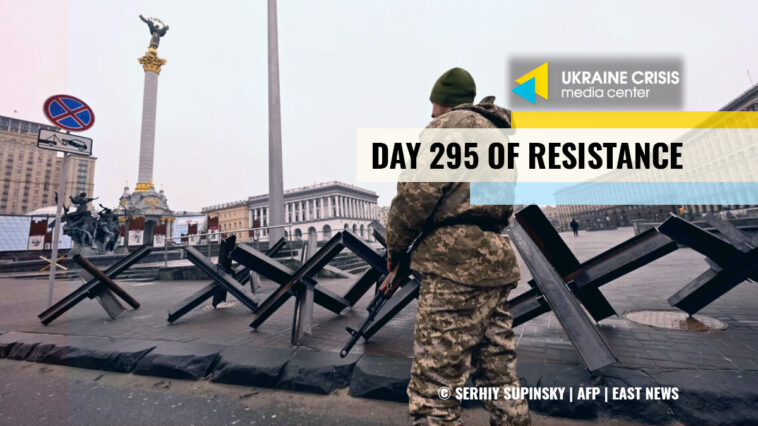Russia could launch another major offensive in early 2023
Russia will possibly have another go at Kyiv. It is preparing resources for a major new offensive in Ukraine in the first months of 2023, Commander-in-Chief of the Armed Forces of Ukraine General Valeriy Zaluzhnyi said in an interview with The Economist on December 3. Highlights of the interview were published on December 15. Read the full text here.
Zalunzhnyi said there are three most important strategic tasks.
The first is to hold the lines and positions, and not lose any more ground. “It’s crucial. Because I know that it is ten to 15 times harder to liberate it than not to surrender it. So our task now is to hold on. Our task is to monitor very clearly with the help of our partners what is going on there, where they are getting ready,” Zaluzhnyi said.
The second is to prepare for Russia’s renewed offensive, which may take place in February, at best in March, and at worst at the end of January. “It may start not in Donbas, but in the direction of Kyiv, in the direction of Belarus, I do not rule out the southern direction as well. (…) [Our task is] to be able to wage a war with fresh forces and reserves. Our troops are all tied up in battles now, they are bleeding. They are bleeding and are being held together solely by courage, heroism and the ability of their commanders to keep the situation under control. (…) May the soldiers in the trenches forgive me, it’s more important to focus on the accumulation of resources right now for the more protracted and heavier battles that may begin next year”.
The third is connected with the first two tasks. This is missile defense and air defense. “I am not an energy expert but it seems to me we are on the edge. We are balancing on a fine line. And if [the power grid] is destroyed…that is when soldiers’ wives and children start freezing. And such a scenario is possible. What kind of mood the fighters will be in, can you imagine? Without water, light and heat, can we talk about preparing reserves to keep fighting? (…) Now we have a ratio of 0.76. Russians are using this 0.76 coefficient of efficacy when they plan their attacks. This means that instead of 76 missiles, they launch 100. And 24 get through and reach their target. And what do two missiles do to a power station? It won’t work for two years. So it has to be built up,” Zaluzhnyi said.
Russian forces strike the center of Kherson, hit medical aid point, killing two
On Thursday afternoon, the Russian forces struck the center of Kherson, killing two, deputy head of the Office of the President of Ukraine Kyrylo Tymoshenko said on Telegram.
The shells fell within 100 meters from the Kherson regional military administration. The building was also damaged by a strike a day earlier.
Two people were killed, and two more injured in the strike. Emergency services sent response units to the scene. The strike hit a medical aid and humanitarian aid delivery point, an employee of a territorial center for emergency medical services and disaster medicine told Suspilne.
A 32-year-old female paramedic and a 70-year-old man were killed in the attack. The man’s identity is unknown at this time. He was there to possibly receive humanitarian aid.
On Wednesday, December 14, the Russian forces shelled the center of Kherson, heavily damaging the first two floors of the Kherson regional military administration. Six people were wounded in Russian artillery strikes on that day. Ukrainian President Volodymyr Zelenskyi said that an 8-year-old boy was killed.
Since retreating from Kherson on November 11, the Russian troops have shelled the liberated city almost daily.
European Parliament recognizes Holodomor as genocide of Ukrainian people
On Thursday, the European Parliament passed a resolution that recognizes the Holodomor of 1932-1933 as genocide of the Ukrainian people. The resolution passed by a vote of 507 to 12.
The resolution expresses solidarity with the people of Ukraine, and commemorates the millions starved to death by Stalin’s regime.
The European Parliament calls on all the countries and international organizations which have not yet recognized the Holodomor as a genocide to do so.
“Whitewashing and glorification of the totalitarian Soviet regime and the revival of Stalin’s cult in Russia has culminated in today’s Russia being a state sponsor of terrorism and a state using terrorist means”, the resolution states.
The MEPs also condemn Russia’s crimes that are being again committed in Ukraine today, including deliberate attacks on civilian energy infrastructure in winter.
“The 90th anniversary of the Holodomor is taking place while Russia is continuing its war of aggression against Ukraine, violating the sovereignty and territorial integrity of that country and seeking to liquidate Ukraine as a nation state and destroy the identity and culture of its people”, the resolution says.
It also condemns a global food crisis caused by Russia’s war, with Russia destroying and looting Ukraine’s grain stores and continuing to make it difficult for Ukraine to export grain to the most deprived countries.
President Zelenskyi welcomed the European Parliament’s decision to recognize Holodomor as genocide of the Ukrainian people.




